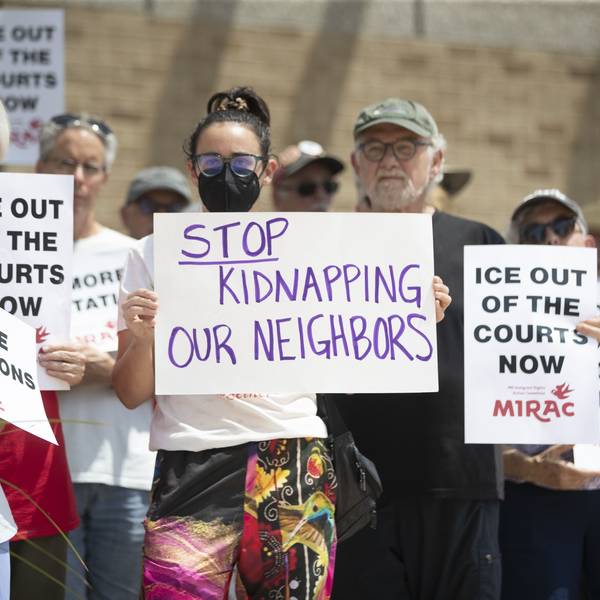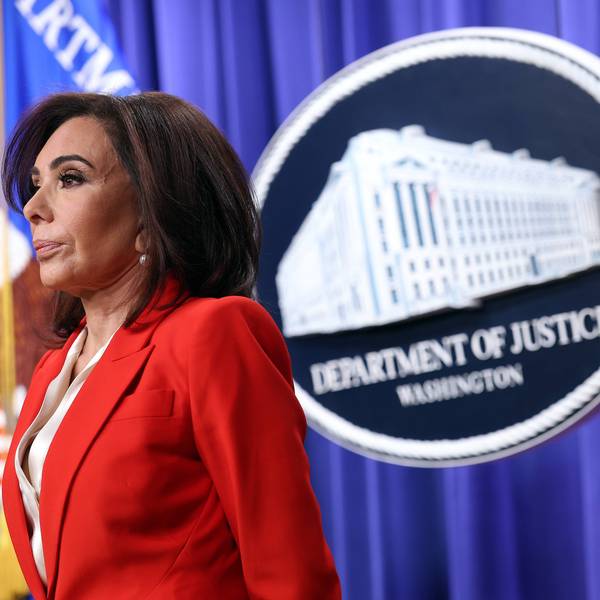The U.S. Supreme Court on Tuesday heard oral arguments--by telephone, because of the coronavirus pandemic--for three cases in which President Donald Trump is trying to block the release of multiple years of his tax returns and financial records subpoenaed by House committees and Manhattan District Attorney Cyrus Vance Jr.
"We, the people, deserve to know in whose interests the president is acting, who he is making laws for, who he is indebted to. This is not unreasonable. This is necessary."
--Maura Quint, Tax March
"Today, the president will argue before the Supreme Court that he can block subpoenas to release his tax returns because he's above the law," tweeted the ACLU before the hearings. "Newsflash: He's not."
The right-wing majority high court includes two Trump appointees: Brett Kavanaugh and Neil Gorsuch. Although Trump's documents are at the center of the disputes, the subpoenas were sent to third parties. Democrat-controlled House committees targeted Deutsche Bank, Capital One, and Mazars USA--the last of which is president's accounting firm that received a grand jury subpoena as part of a state criminal investigation into the Trump Organization launched by Vance, a Democrat.
The livestreamed arguments began at 10 am ET. Hour one was about Trump v. Mazars, which involves a records request from the House Oversight and Government Reform Committee, and Trump v. Deutsche Bank, which involved subpoenas from the Financial Services and Intelligence committees. Hour two focused on Vance v. Trump.
Although the president is being represented by private attorneys in all three cases, his legal team's arguments were bolstered Tuesday by representatives from the U.S. Department of Justice. Trump's lawyers claim that the congressional subpoenas lack a legitimate legislative purpose and that presidential immunity protects him from Vance's criminal probe.
Before these cases reached the country's highest court, the Associated Press explained, "appellate courts in Washington, D.C., and New York brushed aside the president's arguments in decisions that focused on the fact that the subpoenas were addressed to third parties asking for records of Trump's business and financial dealings as a private citizen, not as president."
CNN legal analyst Elie Honig wrote Monday night that federal courts "routinely rule on the enforceability of congressional subpoenas. It would be an unconscionable cop-out by the [Supreme Court] to suddenly change this precedent, essentially rendering the Judicial Branch an ineffectual bystander to core constitutional disputes between Congress and the Executive Branch."
"If Trump's argument against the congressional subpoenas is weak, then his effort to block a prosecutorial subpoena from the Manhattan DA is downright monarchical," Honig warned. "Trump's argument, if accepted, would place the president beyond almost any accountability, and would render law enforcement unable to even gather facts relating to potential crimes committed by the president while in office."
The AP reported on the hearings Tuesday:
There was no apparent consensus about whether to ratify lower court rulings that the subpoenas to Trump's accountant and banks are valid and should be enforced. The justices will meet by phone before the end of the week to take a preliminary vote on how those cases should come out.
The justices sounded particularly concerned in arguments over congressional subpoenas about whether a ruling validating the subpoenas would open the door to harassing future presidents.
...But in the case involving Manhattan District Attorney Cyrus Vance Jr.'s subpoena for Trump's taxes, the justices showed little interest in the broadest argument made by Jay Sekulow, Trump's lawyer, that a president can't be investigated while he holds office.
Advocacy groups took to Twitter throughout the day to draw attention to the lengthy legal battles and denounce the president's handling of them. Stand Up America slammed "Trump's refusal to release personal and business records that would give us transparency into what his interests are."
Citizens for Responsibility and Ethics in Washington (CREW) asked: "What is President Trump fighting so desperately to hide in his tax returns?"
CREW also noted that Trump--who was infamous for his business empire and reality television show before entering the GOP's 2016 presidential primary race--has flouted the precedent set by several of his predecessors by refusing to divest from his business or release his recent tax returns before taking office:
Tax March executive director Maura Quint pointed out on Twitter Tuesday that her group has spent over three years demanding that Trump release his tax returns.
"The president is elected to serve the people," tweeted Quint. "We, the people, deserve to know in whose interests the president is acting, who he is making laws for, who he is indebted to. This is not unreasonable. This is necessary."
Marge Baker of People For the American Way concurred in a statement Monday, declaring that "Donald Trump is not above the law."
"The pending Supreme Court cases regarding the president's taxes and personal financial records are about transparency and the ability to hold elected officials accountable," Baker said. "The outcome of these cases could reshape our Constitution's system of checks and balances, which is why the court must protect congressional oversight of the executive branch and counter the pattern of Trump judges casting votes to protect him and uphold his dangerous policies."
"The American people have the right to know whether the president is abusing power, concealing illegal activities, or dodging his taxes," she added, "especially while millions of people are suffering through a deadly pandemic and the worst economic slump since the Great Depression."




